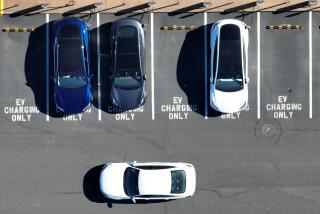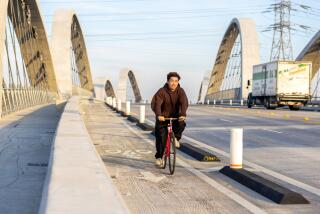Deukmejian Creates Office to Devise Ways to Reduce Traffic Jams
- Share via
Gov. George Deukmejian, while continuing to keep his distance from a legislative proposal to raise gasoline taxes, announced Friday the creation of an “Office of Traffic Improvement” to devise ways to reduce commuter traffic in the state’s congested urban areas.
Deukmejian said the new agency, to be administered by Caltrans, will focus on ways to cut rush-hour travel by state employees and oversee a proposal to provide $10 million in subsidies to private employers who set up van pools for their workers.
In what was billed by his staff as a major announcement on transportation, Deukmejian told the Manufacturers Assn. at the Bonaventure Hotel that industry will have to follow the state’s example and “offer incentives for people to change their driving habits.”
“No amount of additional construction can achieve our goal of reducing congestion if we do not succeed with this plan,” the governor said. “Overheated engines and overheated tempers must be met by a cool resolve to tackle California’s transportation challenges.”
Spotlight on Governor
Deukmejian has been under increasing pressure to do something about the state’s growing transportation problem before the Legislature’s scheduled adjournment next week. The spotlight came to rest on the Deukmejian Administration after the defeat of the governor’s own $1-billion bond measure on the June ballot.
The governor has said he believes that motorists will change their driving habits and reduce traffic congestion if there are incentives to do it. Again on Friday, Deukmejian emphasized that he has no intention of getting in the way of “true love” that Californians feel for their cars.
But legislators from both parties have grown increasingly irritated with the governor’s reluctance to get behind any long-range solution to the transportation problem that might involve higher taxes.
Lawmakers are attempting to put together an agreement to phase in an 8-cent per gallon gasoline tax increase over five years, maintaining that is the only way to pay for as much as $20 billion in freeway and local road improvements needed for the future.
Negotiations on the tax plan have been bogged down in part because of controversy over the need to alter the state’s voter-approved spending limit so that the additional tax revenues could be spent rather than automatically rebated to taxpayers, as the limit now requires.
Deukmejian, who opposes any gas tax increase, has suggested that he might be willing to allow such a proposal to go on the ballot but has made no effort to keep the negotiations going.
Governor’s Support ‘Depends’
In an interview after his speech, the governor said he had no idea whether an agreement would be reached before the legislative session ends Wednesday. He said his support for allowing a tax measure on the ballot “all depends upon what’s in it. I really can’t answer that right now until I see the final package.”
In his address, Deukmejian did not mention the gas tax proposal but said that despite the June defeat of his $1-billion bond measure, he believes that “bonds are still the best way to secure additional funding for road construction.” By issuing bonds, the state can raise money immediately but must repay bond holders with interest over future years. Deukmejian’s legislative critics say the financing plan is too costly and would not raise nearly enough money to solve critical transportation problems.
Deukmejian told the business group that “regardless of how the funding debate is resolved, and I believe it will be, it’s time for business, for government and for the public to face a simple reality: More construction alone won’t get California moving again the way we want it to move. We must make better use of the fine transportation network we already have in place.”
Aides to the governor said the specific goals of the new Office of Transportation Improvement include cutting by 10% rush-hour trips by state employees in urban areas, providing cash bonuses for van pool drivers, expanding use of staggered work hours for state employees who use car pools or mass transit and developing additional high-tech solutions to traffic congestion.
More to Read
Get the L.A. Times Politics newsletter
Deeply reported insights into legislation, politics and policy from Sacramento, Washington and beyond. In your inbox twice per week.
You may occasionally receive promotional content from the Los Angeles Times.










